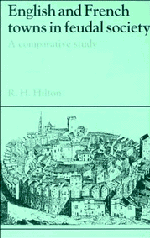1 - The town and feudalism: preliminary definitions
Published online by Cambridge University Press: 03 May 2011
Summary
A TOWN IS A TOWN WHEREVER IT IS?
What was a town? A preliminary definition, however general, may be useful. The definition need not attempt to cover all towns from antiquity to the twentieth century, but only those of medieval, feudal society. One of the problems is that even medieval towns varied greatly in size and function, from small market towns with even fewer than 1,000 inhabitants to great cities, like Paris, with more than 100,000. A useful definition may, then, be rather what was not a town than what was. In effect, the town has to be distinguished from its rural hinterland and not, as some historians have tended to do, to be assimilated into the agrarian economy and society.
The first point to be made is that the town, great or small, was the location of permanent market activity, not only at a weekly chartered market, which the lords of many villages also obtained in the thirteenth century. Second, and this is crucial, the inhabitants of the town did not, in contrast to those of the village, produce their own means of subsistence, even though they might have small vegetable plots, vineyards or even meadows. Their main activity was devoted to manufacture and trade, from which the bulk of their income was derived.
- Type
- Chapter
- Information
- English and French Towns in Feudal SocietyA Comparative Study, pp. 6 - 24Publisher: Cambridge University PressPrint publication year: 1992



